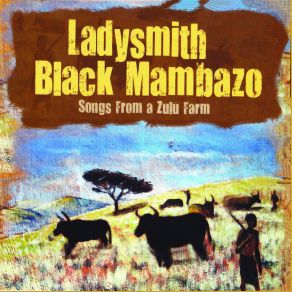Songs from a Zulufarm
Download links and information about Songs from a Zulufarm by Ladysmith Black Mambazo. This album was released in 2011 and it belongs to Gospel, Rock, World Music, Pop genres. It contains 16 tracks with total duration of 46:35 minutes.

|
|
|---|---|
| Artist: | Ladysmith Black Mambazo |
| Release date: | 2011 |
| Genre: | Gospel, Rock, World Music, Pop |
| Tracks: | 16 |
| Duration: | 46:35 |
| Buy it NOW at: | |
| Buy on iTunes $4.99 | |
| Buy on iTunes $6.99 | |
Tracks
[Edit]| No. | Title | Length |
|---|---|---|
| 1. | Yangiluma Inkukhu (The Biting Chicken) | 3:05 |
| 2. | Zulu Laduma (Voice Like Thunder) | 3:03 |
| 3. | Imithi Gobakahle (Children Come Home) | 3:57 |
| 4. | Wemfazi Ongaphesheya (River Talk) | 1:06 |
| 5. | Cabhayeye (Puddles) | 1:50 |
| 6. | Ntulube (Away, You River Snakes) | 3:13 |
| 7. | Wemfana (Bad Donkey) | 3:55 |
| 8. | Ekhaya (Don't Leave Home Too Soon) | 3:34 |
| 9. | Leliyafu (Clouds, Move Away) | 2:58 |
| 10. | Uthekwane (The Prettiest Bird?) | 2:37 |
| 11. | Imbongolo (The Donkey's Complaint) | 1:44 |
| 12. | Ixegezi (Catch the Bird) | 2:14 |
| 13. | Lezonkomo (Praise the Cows & Bulls) | 3:48 |
| 14. | Vuka (Wake up Little Chicks) | 2:28 |
| 15. | Thalaza (I Miss My Home, I Miss the Farm) | 4:02 |
| 16. | Old Mcdonald (Zulu Style) | 3:01 |
Details
[Edit]Something of a follow-up to 1994's Gift of the Tortoise, Songs from a Zulu Farm is another Ladysmith Black Mabazo children's album, on which the nine-member South African male choir led by Joseph Shabalala sings traditional songs relating to children, specifically back home on the farm. Since the singing is in Zulu for the most part, the focus on nature, children, and animals may not be immediately apparent to an English speaker, who will hear the disc as a typical collection of a cappella singing, with Shabalala taking a lead part in front of the group's harmonies on short, repeated phrases. But occasionally the sounds of laughing children and animals intrude, and occasionally an English phrase is used, such as in "Imithi Gobakahle (Children Come Home)." Children on the farm in South Africa face issues that may not be encountered elsewhere, as is apparent in "Ntulube (Away, You River Snakes)." But they seem to be as fascinated by animals as children anywhere, and it's no surprise that "Old McDonald…Zulu Style" sounds like "Old McDonald" in other countries, complete with the sounds the animals make, common in any language.